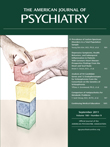Exaggerated Activation of Dorsal Anterior Cingulate Cortex During Cognitive Interference: A Monozygotic Twin Study of Posttraumatic Stress Disorder
Abstract
Objective:
Neuroimaging studies have revealed functional abnormalities in the anterior cingulate cortex in posttraumatic stress disorder (PTSD). The goal of this study was to determine whether hyperresponsivity of the dorsal anterior cingulate in PTSD is an acquired characteristic or a familial risk factor.
Method:
Using a case-control twin design, the authors studied combat-exposed veterans with PTSD (N=12) and their identical combat-unexposed co-twins (N=12), as well as combat-exposed veterans without PTSD (N=14) and their identical combat-unexposed co-twins (N=14). Participants underwent functional MRI during completion of the Multi-Source Interference Task, which reliably activates the dorsal anterior cingulate.
Results:
Combat-exposed veterans with PTSD and their unexposed co-twins had significantly greater activation in the dorsal anterior cingulate and tended to have larger response time difference scores, as compared to combat-exposed veterans without PTSD and their co-twins. Dorsal anterior cingulate activation in the exposed twins was positively correlated with their PTSD symptom severity. Dorsal anterior cingulate activation in the unexposed twins was positively correlated with their combat-exposed co-twins' PTSD symptom severity, but not with depression or alcohol use severity in the combat-exposed co-twins.
Conclusions:
Hyperresponsivity in the dorsal anterior cingulate appears to be a familial risk factor for the development of PTSD following psychological trauma.



